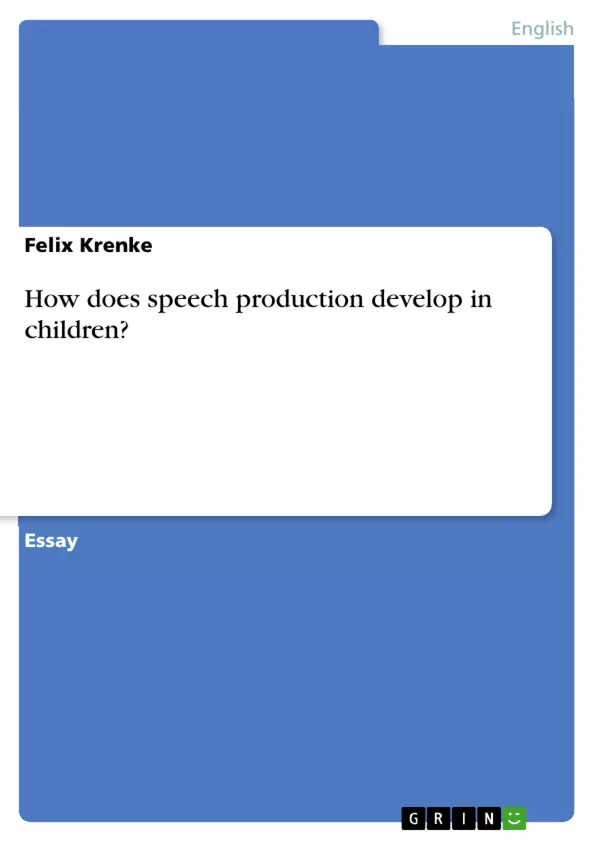Children fullfill a huge task when they successfully learn their mother tongue. Other than adults who attempt to learn a new language they do not have to study vocabulary or grammar explicitly, but they seem to absorb all the words and rules which are presented to them. This essay will shed some light on language development in children, so it deals with infantine speech perception and production, the main stages of this process and the mental lexicon. I attempt to show that children's mental lexicon and adult's mental lexicon are essentially the same.
Inhaltsverzeichnis (Table of Contents)
- Main Stages of Speech development
- Differences to Adult speech, Production and Perception
Zielsetzung und Themenschwerpunkte (Objectives and Key Themes)
This essay aims to provide an overview of language development in children, focusing on the stages of speech perception and production, and the evolution of the mental lexicon. It examines the similarities and differences between children's and adults' mental lexicons.
- Stages of speech development in children
- The role of the mental lexicon in language acquisition
- Differences between adult and child speech
- Overextension and underextension in early vocabulary development
- Prototype theory and its application to language learning
Zusammenfassung der Kapitel (Chapter Summaries)
- Main Stages of Speech development: This chapter explores the key stages of speech development in children, from early auditory perception to the production of their first words. It discusses the role of babbling and the gradual acquisition of syntax. The chapter also highlights the importance of the mental lexicon in language learning, and how children acquire new words and their meanings.
- Differences to Adult speech, Production and Perception: This chapter focuses on the differences between adult and child speech production and perception. It examines how language changes over time and how children learn to use language in context. The chapter also explores the phenomenon of overextension and underextension in early vocabulary development and the application of the prototype theory to language learning.
Schlüsselwörter (Keywords)
This preview primarily explores the process of language acquisition in children, focusing on speech development, the mental lexicon, and the key differences between child and adult speech. The text discusses the influence of environmental factors, the role of babbling, and the gradual acquisition of syntax. Key concepts include overextension, underextension, and the prototype theory.
Frequently Asked Questions
How do children learn their mother tongue?
Unlike adults, children do not study grammar explicitly. They absorb rules and vocabulary from their environment through a natural process of perception and production.
What are the main stages of speech development?
The process typically starts with auditory perception, followed by babbling, then the production of single words (holophrastic stage), and finally complex syntax.
What is the "mental lexicon"?
The mental lexicon is a person's mental dictionary that stores information about words, their meanings, pronunciation, and grammatical properties.
What is overextension in child language?
Overextension occurs when a child uses a single word to refer to a broader category than it actually covers, such as calling all four-legged animals "dog."
What is the difference between child and adult speech production?
Children's speech production is limited by developing motor skills and a smaller vocabulary, though their underlying mental structures for language are remarkably similar to those of adults.
- Citation du texte
- M. A., M. Ed. Felix Krenke (Auteur), 2014, How does speech production develop in children?, Munich, GRIN Verlag, https://www.grin.com/document/1007988



